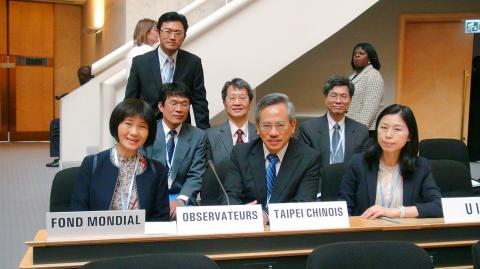Taiwan Solidarity Union (TSU) Legislator Lin Shih-chia (林世嘉) was escorted out of the 65th World Health Assembly (WHA) meeting in Geneva on its opening day on Monday and had her observer credentials confiscated for wearing a T-shirt with the words “Taiwan is Taiwan, not China.”
Lin said her T-shirt was “a form of silent protest” against President Ma Ying-jeou’s (馬英九) references to “one country, two areas (一國兩區)” in his inauguration speech on Sunday, adding that she wanted to send a clear message that Taiwan is not a part of China.
“I took off my jacket while WHO Director-General Margaret Chan (陳馮富珍) was addressing the assembly in a bid to make a clear statement that the ‘one country, two areas’ framework does not exist in Taiwan,” Lin said in a telephone interview with the Central News Agency yesterday.

Photo: CNA
Shortly after her “silent protest,” Lin said she was asked to leave the conference hall by the WHO’s security staff, but added that she left on her own initiative and did not cause any disturbance.
Displaying the T-shirt was only a way of expressing her stance in a silent manner, but the WHO could not tolerate such an approach, Lin said.
“How much diplomatic space does Taiwan really have left?” Lin said indignantly.
“If I were wearing a T-shirt that read ‘I am Lady Gaga’s little monster,’ maybe I would not have been treated in such a manner,” she said.
Commenting on the incident, Department of Health Minister Chiu Wen-ta (邱文達) said that opinions should be expressed in a manner that conforms with international protocol.
On a comment in which he was quoted by Chinese Nationalist Party (KMT) Legislator Su Ching-chuan (蘇清泉) as having said that Chan asked Chiu “why would [you] create trouble during my speech?” the health minister denied the WHO director-general mentioned the issue during an informal meeting, adding that she merely came and said hello.
Lin said she had applied to take part in the WHA as a Taiwanese observer in the past, but had been refused. She said she was only granted observer status this year in her capacity as a lawmaker and with help from Taiwanese representatives in Europe.
Expressing regret over Lin’s eviction, Taiwan’s representative office in Geneva said Lin had been escorted out in accordance with WHA regulations, which stipulate that participants cannot take slogans, flyers or propaganda material into the conference hall.

Auckland rang in 2026 with a downtown fireworks display launched from New Zealand’s tallest structure, Sky Tower, making it the first major city to greet the new year at a celebration dampened by rain, while crowds in Taipei braved the elements to watch Taipei 101’s display. South Pacific countries are the first to bid farewell to 2025. Clocks struck midnight in Auckland, with a population of 1.7 million, 18 hours before the famous ball was to drop in New York’s Times Square. The five-minute display involved 3,500 fireworks launched from the 240m Sky Tower. Smaller community events were canceled across New Zealand’s

The Ministry of Foreign Affairs (MOFA) yesterday said it is closely monitoring developments in Venezuela, and would continue to cooperate with democratic allies and work together for regional and global security, stability, and prosperity. The remarks came after the US on Saturday launched a series of airstrikes in Venezuela and kidnapped Venezuelan President Nicolas Maduro, who was later flown to New York along with his wife. The pair face US charges related to drug trafficking and alleged cooperation with gangs designated as terrorist organizations. Maduro has denied the allegations. The ministry said that it is closely monitoring the political and economic situation

‘SLICING METHOD’: In the event of a blockade, the China Coast Guard would intercept Taiwanese ships while its navy would seek to deter foreign intervention China’s military drills around Taiwan this week signaled potential strategies to cut the nation off from energy supplies and foreign military assistance, a US think tank report said. The Chinese People’s Liberation Army (PLA) conducted what it called “Justice Mission 2025” exercises from Monday to Tuesday in five maritime zones and airspace around Taiwan, calling them a warning to “Taiwanese independence” forces. In a report released on Wednesday, the Institute for the Study of War said the exercises effectively simulated blocking shipping routes to major port cities, including Kaohsiung, Keelung and Hualien. Taiwan would be highly vulnerable under such a blockade, because it

UNRELENTING: China attempted cyberattacks on Taiwan’s critical infrastructure 2.63 million times per day last year, up from 1.23 million in 2023, the NSB said China’s cyberarmy has long engaged in cyberattacks against Taiwan’s critical infrastructure, employing diverse and evolving tactics, the National Security Bureau (NSB) said yesterday, adding that cyberattacks on critical energy infrastructure last year increased 10-fold compared with the previous year. The NSB yesterday released a report titled Analysis on China’s Cyber Threats to Taiwan’s Critical Infrastructure in 2025, outlining the number of cyberattacks, major tactics and hacker groups. Taiwan’s national intelligence community identified a large number of cybersecurity incidents last year, the bureau said in a statement. China’s cyberarmy last year launched an average of 2.63 million intrusion attempts per day targeting Taiwan’s critical